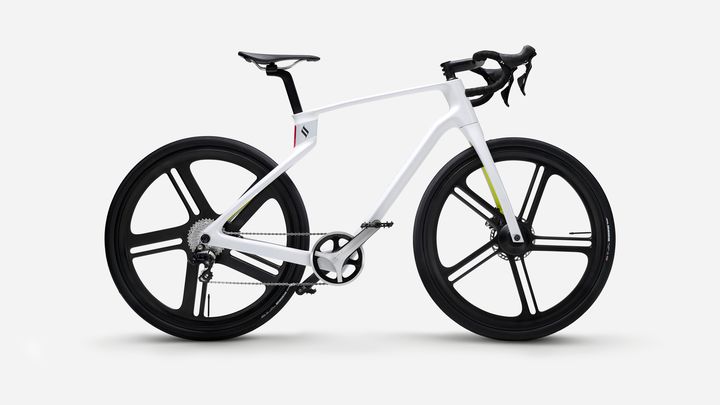
California startup Superstrata just launched a new e-bike made with 3D printed continuous carbon fiber.
Arevo Carbon Fiber
If that sounds familiar, you might connect the dots to realize the company has made use of Arevo’s 3D printed continuous carbon fiber manufacturing process. Also a California startup, Arevo is a fascinating 3D printing company that has tied several advanced technologies together to produce a new kind of manufacturing service that can easily produce complex objects using continuous carbon fiber.
We took a look at them in May, and at the time their marketing materials often included images of bike frames in various stages of 3D printing. Thus, it’s not that much of a surprise to find they have a live customer producing bikes with their technology.
Superstrata Terra and Ion
In fact, Superstrata’s product is actually two bikes, the Terra and the Ion. The Terra is an e-bike, meaning it has a small electric motor on board to power you along when your legs are less functional. The Ion is a traditional bike, although only “traditional” in that it doesn’t include the motor of the Terra.
Although the Terra is an e-bike, it’s actually hard to tell from a quick glance, as Superstrata has somehow embedded the motors inside the unit in such a way as to make it appear to be a normal, human-powered bike.
Carbon fiber is a well-known material that has been used to produce very lightweight bikes in the past, but they’ve all suffered from a significant issue: fragility. These early carbon fiber bikes were made from separate carbon fiber components that were connected by joints. These were the weak spots, and if sufficiently bumped, the frame would break apart at the joints.
This problem is apparently solved as the Superstrata bikes are printed by Arevo as a unibody: there’s only ONE part to the frame. The continuous carbon fiber strands are lain inside the unibody frame to ensure that it is incredibly strong and can withstand far more stress than conventional carbon fiber bikes.
The specifications for the Terra and Ion bikes are impressive. The Terra’s frame weighs only 1300g, which they say is “less than the weight of two water bottles”. Wow.
The lightweight frame allows for more effective use of energy, both by humans and from the electric motor on the Ion. The Ion, which can be fully charged in only two hours, has an estimated electric range of up to 96km (60mi), with a top speed of 32kmh (20mph). Maybe you don’t have to pedal the Ion, ever?
Custom-Fit 3D Printed Bike
There’s another incredible feature of both the Terra and Ion bikes: they are custom-fit. Because they are all individually 3D printed, it’s entirely possible to vary their size and shape. Thus the plan here is to have the buyers provide their measurements and a Terra (or Ion) will be produced to precisely fit.
Superstrata has launched the new bikes as a crowdfunding campaign on Indiegogo, where as of this writing they’ve sold quite a few units. The prices vary somewhat, but basically you’ll get a Terra for around US$1300, and an Ion for US$1800. These seem to be near 50% off their upcoming retail prices.
Superstrata says:
“It will feel like it was made just for you… because it was.”
Via Superstrata and Indiegogo
